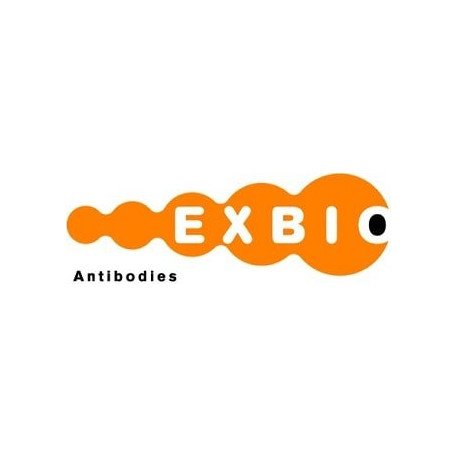Cart 0 Product Products (empty)
No products
To be determined Shipping
0,00 € Total
Prices are tax excluded
Product successfully added to your shopping cart
Quantity
Total
There are 0 items in your cart. There is 1 item in your cart.
Total products (tax excl.)
Total shipping (tax excl.) To be determined
Total (tax excl.)
Data sheet of Mouse Monoclonal to Ku80 Antigen / DNA helicase p80
| Brand | Exbio |
| Product type | Primary antibodies |
| Reactivity | Human |
| Clonality | Monoclonal |
More info about Mouse Monoclonal to Ku80 Antigen / DNA helicase p80
| Brand: | Exbio |
| Product no.: | 11-496-C025 |
| Product type: | Primary antibodies |
| Host species: | Mouse |
| Product name: | Mouse Monoclonal to Ku80 Antigen / DNA helicase p80 |
| Antigen: | Ku80 Antigen / DNA helicase p80 |
| Clonality: | Monoclonal |
| Clone: | MEM-54 |
| Isotype: | IgG2a |
| Immunogen: | human whole T-lymphocytes |
| Format: | purified |
| Specificity: | The antibody MEM-54 reacts with Ku80, a 80 kDa subunit of Ku autoantigen (heterodimer of 72 and 87 kDa polypeptides). Ku autoantigen is involved in DNA repair and in V(D)J recombination through its ability to bind DNA double-strand breaks. |
| Categories: | Transcription Regulation & Nuclear Proteins (Human), Transcription Regulation & Nuclear Proteins |
| Concentration: | 1 mg/ml |
| Storage buffer: | Phosphate buffered saline (PBS) with 15 mM sodium azide, approx. pH 7.4 |
| Storage / stability: | Store at 2-8°C. Do not freeze. Do not use after expiration date stamped on vial label. |
| Background: | Ku Antigen (DNA-dependent DNA helicase) is a heterodimer (of 72 and 87 kDa polypeptides) which contributes to genomic integrity through its ability to bind DNA double-strand breaks and facilitate repair by the nonhomologous end-joining pathway. A DNA double-strand break is a major lesion that destroys the integrity of the DNA molecule. Such damage is introduced by ionizing radiation. Ku binds to free double-stranded DNA ends and is the DNA-binding component of the DNA-dependent protein kinase. Thus, the Ku protein is involved in DNA repair and in V(D)J recombination, and the Ku-DNA-dependent protein kinase complex may have a role in those same processes. Ku70 and Ku80 share a common topology and form a dyad-symmetrical molecule with a preformed ring that encircles duplex DNA. The binding site can cradle 2 full turns of DNA while encircling only the central 3-4 base pairs. Ku makes no contacts with DNA bases and few with the sugar-phosphate backbone, but it fits sterically to major and minor groove contours so as to position the DNA helix in a defined path through the protein ring. These features are well designed to structurally support broken DNA ends and to bring the DNA helix into phase across the junction during end processing and ligation. Mouse cells deficient for Ku80 display a marked increase in chromosomal aberrations, including breakage, translocations, and aneuploidy. Despite the observed chromosome instabilities, Ku80 -/- mice have only a slightly earlier onset of cancer. Loss of p53 synergizes with Ku80 to promote tumorigenesis such that all Ku80 -/- and p53 -/- mice succumb to disseminated pro-B-cell lymphoma before 3 months of age. The p70/p80 complex binds to the ends of double-stranded DNA in a cell cycle-dependent manner, being associated with chromosomes of interphase cells, followed by complete dissociation from the condensing chromosomes in early prophase. Some patients with systemic lupus erythematosus produce very large amounts of autoantibodies to p70 and p80. The autoantibody has been found in patients with autoimmune thyroid disease (Graves disease) as well as in those with lupus. |
| Purity: | > 95% (by SDS-PAGE) |
| Purification: | Purified by protein-A affinity chromatography |
| Related products: | - Mouse Monoclonal to LARGE1 - Mouse Monoclonal to Lambda light chains - Mouse Monoclonal to Lamin C |
| Shipping condition: | Room temperature |


